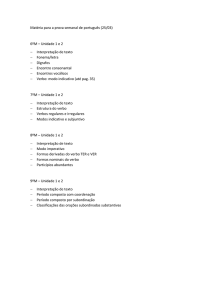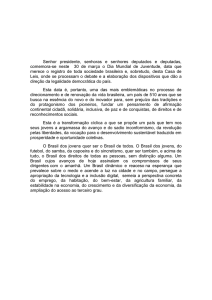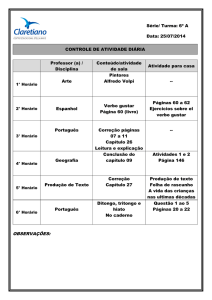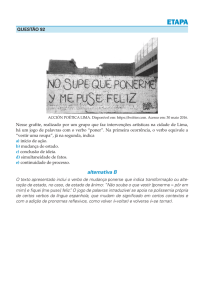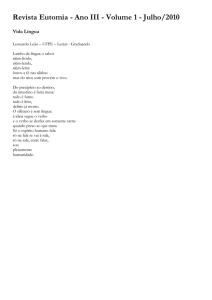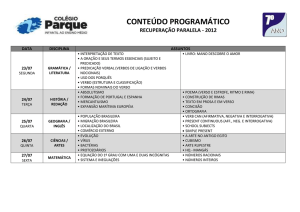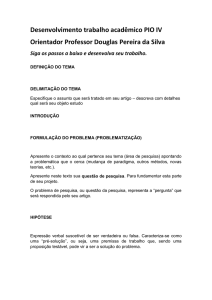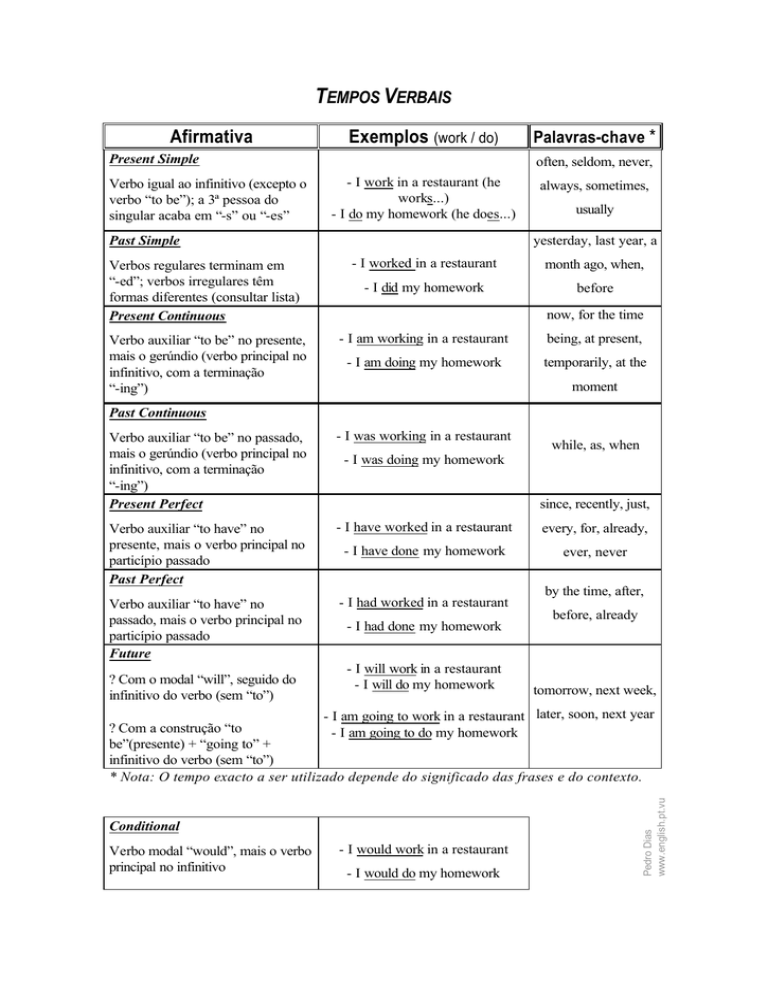
TEMPOS VERBAIS
Afirmativa
Exemplos (work / do)
Present Simple
Verbo igual ao infinitivo (excepto o
verbo “to be”); a 3ª pessoa do
singular acaba em “-s” ou “-es”
Palavras-chave *
often, seldom, never,
- I work in a restaurant (he
works...)
- I do my homework (he does...)
Past Simple
always, sometimes,
usually
yesterday, last year, a
Verbos regulares terminam em
“-ed”; verbos irregulares têm
formas diferentes (consultar lista)
Present Continuous
- I worked in a restaurant
month ago, when,
- I did my homework
before
Verbo auxiliar “to be” no presente,
mais o gerúndio (verbo principal no
infinitivo, com a terminação
“-ing”)
- I am working in a restaurant
being, at present,
- I am doing my homework
temporarily, at the
now, for the time
moment
Past Continuous
Verbo auxiliar “to be” no passado,
mais o gerúndio (verbo principal no
infinitivo, com a terminação
“-ing”)
Present Perfect
- I was working in a restaurant
Verbo auxiliar “to have” no
presente, mais o verbo principal no
particípio passado
Past Perfect
- I have worked in a restaurant
every, for, already,
- I have done my homework
ever, never
Verbo auxiliar “to have” no
passado, mais o verbo principal no
particípio passado
Future
- I had worked in a restaurant
? Com o modal “will”, seguido do
infinitivo do verbo (sem “to”)
- I will work in a restaurant
- I will do my homework
while, as, when
- I was doing my homework
since, recently, just,
- I had done my homework
by the time, after,
before, already
tomorrow, next week,
Conditional
Verbo modal “would”, mais o verbo
principal no infinitivo
- I would work in a restaurant
- I would do my homework
Pedro Dias
www.english.pt.vu
- I am going to work in a restaurant later, soon, next year
? Com a construção “to
- I am going to do my homework
be”(presente) + “going to” +
infinitivo do verbo (sem “to”)
* Nota: O tempo exacto a ser utilizado depende do significado das frases e do contexto.
Negativa
Exemplos
Present Simple
Ao verbo “be” acrescenta-se “not”. Os outros
verbos levam “don’t” ou “doesn’t” antes;
desaparece o “-s” da 3ª pessoa do singular
Past Simple
- He isn’t at home
- I don’t work here / He doesn’t work here
Ao verbo “be” acrescenta-se “not”. Os outros
verbos levam “didn’t” antes; o verbo fica no
infinitivo
Present Continuous
- We weren’t in the park
Ao verbo “be” acrescenta-se “not”.
- He didn’t go into a bar
- I am not doing that
- They aren’t playing
Past Continuous
Ao verbo “be” no passado acrescenta-se “not”.
- I wasn’t doing that
- They weren’t playing
Present Perfect
Ao verbo “have” acrescenta-se “not”.
- I haven’t eaten in this restaurant
- She hasn’t lived in Portugal
Past Perfect
Ao verbo “have” no passado acrescenta-se
“not”.
- I hadn’t eaten in this restaurant
- She hadn’t lived in Portugal
Future
? “will” ? “will not” ou “won’t”
? “be + going to” ? “be + not + going to”
- I will not work in a restaurant
- You won’t do your homework
- I am not to work in a restaurant
- You aren’t going to do your homework
Conditional
- I would not work in a restaurant
- You wouldn’t do your homework
Pedro Dias
www.english.pt.vu
“would” ? “would not” ou “wouldn’t”

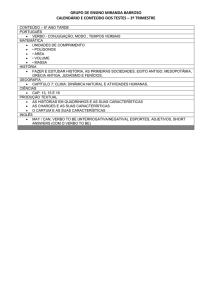
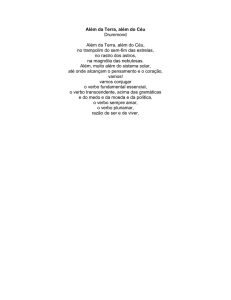
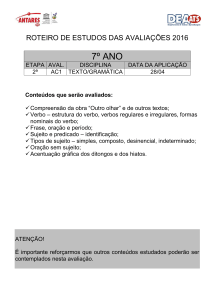
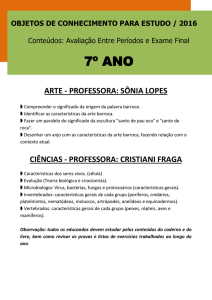
![[1] 22 Data Turma PROFESSOR / DISCIPLINA CONTEÚDO](http://s1.studylibpt.com/store/data/003113195_1-325d5632c38bd4fd4c0c1e89af27ac20-300x300.png)
